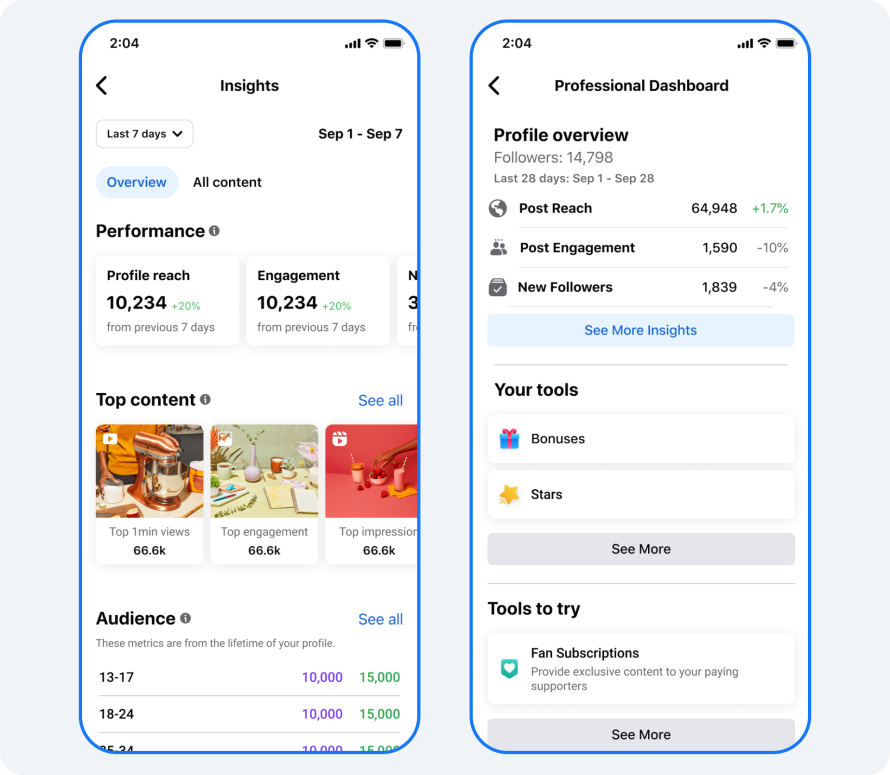Facebook’s ‘professional mode’, which was first rolled out in 2021, has just been extended to all creators on the platform, making it easier for users to create, build and profit from their following.
The professional mode unlocks a range of social media management tools, including advanced analytic and well-being capabilities, and a ‘Stars’ feature that lets creators earn money directly from Reels, live streams, and on-demand videos.
Meta is also opening up more benefits to Instagram creators by expanding access to subscriptions and letting them create NFTs and sell them directly to fans. But as TikTok continues to eat up Meta’s ad revenue, have these changes been introduced a little too late?
Facebook Expands its Professional Mode to All Creators
From losing 25% of its market share to receiving backlash from major inventors for its unwavering commitment to the Metaverse, it’s been a rocky few weeks for Meta. However, in a welcome break from the doom and gloom, the tech company has just announced a string of measures aimed at helping its army of creators.
Most notably, in a blog post recently released by the company, it revealed that it would be expanding its professional mode to all Facebook creators. This mode, which was first introduced in December 2021, gives creators access to a wide range of professional tools that were previously only available through Facebook Pages.
“Professional mode allows you to build a global audience of followers, while still staying connected to friends and family from your personal Facebook profile,” – Meta’s blog post
We break down some features that are included in the profile setting below:
What Are the Benefits of Professional Mode?
One of the best selling points of Facebook’s professional mode is its unique ‘Stars’ feature which lets content creators earn money through followers directly through Reels, live, and on-demand videos. Professional users also gain access to subscriptions, which allows them to share content exclusively with subscribers on the platform.

Creators using the setting can also benefit from a profile category, which will display the name of their brand directly under their name on Facebook. What’s more, Meta’s Professional Dashboard’ also provides professional users with valuble audience, profile, and content insights, making it easier to monitor performance across the platform.
Facebook hasn’t been the easiest platform to profit from historically, so these changes will likely be welcomed by creators using the site. But Facebook isn’t the only Meta-owned app that is changing for content makers.
Instagram Creators Can Now Make and Sell NFTs
If Instagram is your main money maker, rest assured, Meta is also opening up revenue-making opportunities on the image-based platform.
Remarkably, Instagram creators will soon be able to create their own unique NFT, before selling it directly to their fans both on and off the social media site. This update gives users access to an NFT-creating toolkit which will also help them to showcase and sell the end result.
Meta won’t be taking a percentage of the NFT creator’s revenue either, which means they’ll get to keep 100% of the earnings. The company is currently testing this feature with a small group of creators in the US and is planning to expand its accessibility in the coming months.
Aside from helping users create their own cryptographic assets, Meta is also expanding access to their Instagram subscriptions service to all eligible creators in the US This will make it much easier for select users to profit from exclusive Live videos and Stories.
Will Meta’s Plans to Boost Ad Revenue Work?
While Zuckerburg continues to double down on the importance of the Metaverse and the company’s future in artificial intelligence, it’s encouraging that he’s still choosing to invest in the creator economy. However, with Meta’s ad revenue tanking 4% year-on-year, it’s likely this decision wasn’t purely altruistic.
While Meta still retains a strong lead in active monthly users, apps like TikTok continue to chip away at the Facebook and Instagram userbase. What’s more, as platforms like TikTok gain momentum with advertisers, Meta is losing out on more opportunities to profit from ads.
Making Facebook and Instagram a better place for users which the platforms depend upon is clearly a step in the right direction. But as ad companies continue to respond to user trends, more incentives might be needed to keep creators on the sites.




